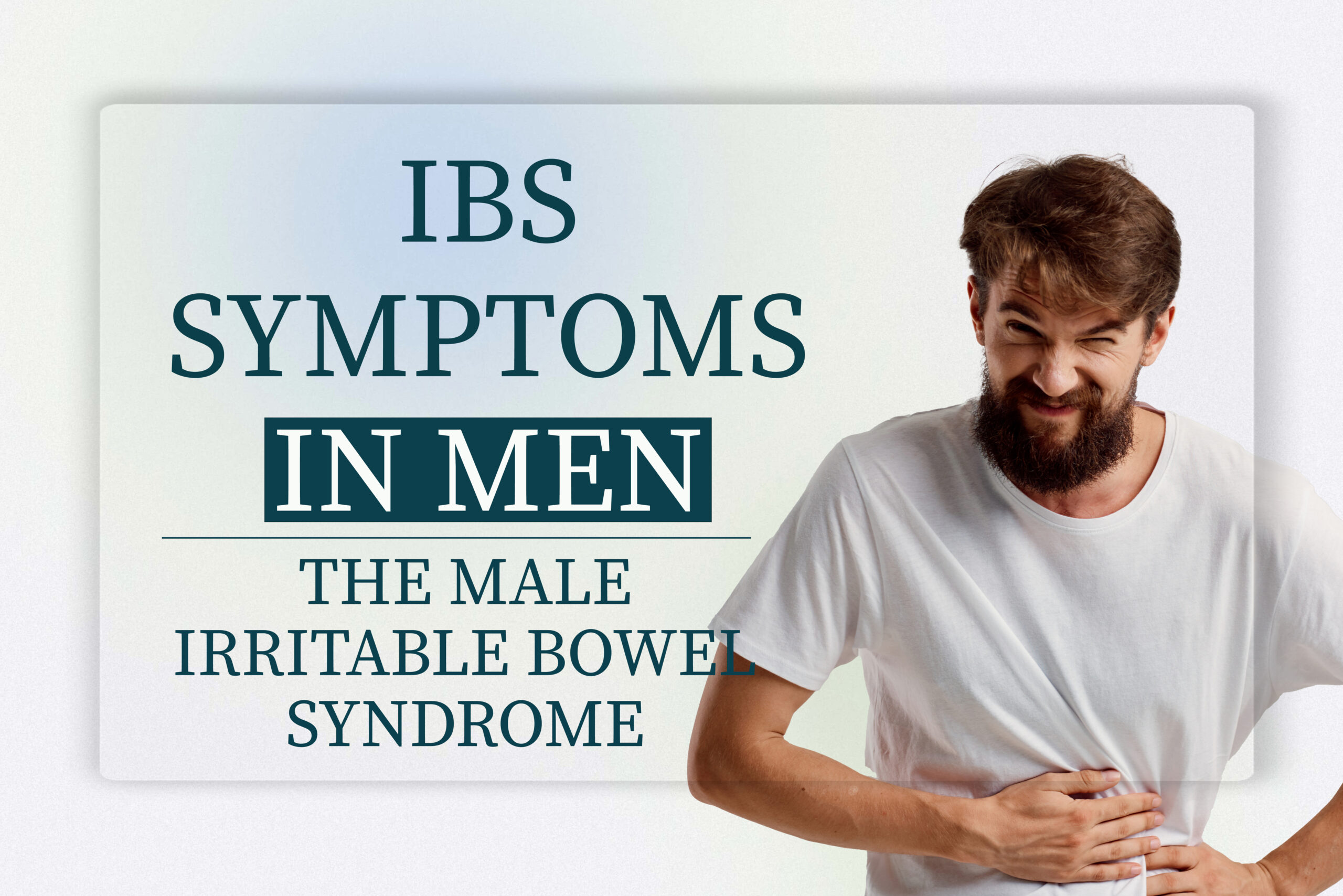
Find the full description and treatment of IRRITABLE BOWEL SYNDROME IN MEN in IBSYNCRASY
The male irritable bowel syndrome
When we discuss irritable bowel syndrome (IBS), most conversations center around women. However, IBS symptoms in men are an equally significant challenge. Men often experience a unique set of IBS symptoms that go beyond the typical digestive disturbances. These symptoms not only affect the bowel, with diarrhea, constipation, or alternating patterns such as IBS-D and IBS-C, but also lead to a cascade of complications involving other proximal regions, like the pelvis and the prostate

Irritable bowel syndrome is a complex syndrome that manifests through various symptoms include abdominal pain, bloat, cramp, and altered bowel habits. An IBS flare in men may range from abdominal pain and bloat to severe episodes of diarrhea or constipation. These symptoms of IBS disrupt daily life and can extend their impact to other aspects of health, including sex and overall wellbeing.
Intense abdominal pain, persistent bloat, and cramping that seems to come out of nowhere are some of the forms of an IBSattack. The symptoms include a continuous, uncomfortable residual feeling after bowel movements, and an erratic pattern in stool consistency—sometimes constipation (IBS-C) and other times diarrhea (IBS-D). These disruptions are not only physically exhausting but also emotionally draining, affecting confidence and sometimes even the ability to enjoy sex. Many men describe it as having a digestive system that is perpetually “on edge,” making even routine decisions about what certain foods to eat a daunting task.
In many cases, the treatment for prostatitis inadvertently intertwines with the management of IBS symptoms. The prostate in a male is anatomically located just in front of the rectum, separated only by a thin layer of fat and a shared network of blood vessels. This close proximity means that inflammation in the prostate—often stemming from chronic prostatitis—can directly affect the bowel.
When the prostate becomes inflamed, it may trigger a cascade of gastrointestinal reactions. For instance, the inflammatory process may lead to increased abdominal pain, promote bloat, and disrupt normal stool formation, leading to either diarrhea or constipation. The phenomenon is such that ibs symptoms can intensify during a prostatitis flare-up, creating a vicious cycle that is challenging to break.
The causes of IBS in men are multifactorial. Several factors contribute to this condition:
Thus, the cause ibs in men is often a result of this interconnected web of factors, where chronic prostatitis and an altered gut microbiome play significant roles.
The anatomical link between the prostate and the bowel is a key factor in understanding why IBS symptoms are so pronounced in men with prostatitis. The prostate sits in a strategic location just in front of the rectum. Due to this close proximity, inflammation in the prostate can send inflammatory signals directly to the bowel, impacting its function. The thin layer of fat between these organs offers little insulation, allowing the inflammation to spread.
This anatomical relationship means that any treatment aimed solely at relieving prostatitis may not address the irritable aspects of the bowel. Instead, a comprehensive approach that considers both conditions is essential for effective management. For instance, a man with a gastrointestinal cramp and bloat may be experiencing a direct consequence of prostatic inflammation. Recognizing this link is crucial for devising a treatment plan that tackles both the irritable bowel syndrome and prostatitis concurrently.

John’s story is a compelling example of how IBS symptoms and prostatitis can coexist and aggravate each other. At 44, John began experiencing mild digestive discomfort that quickly evolved into severe abdominal pain and bloat. Initially, his IBS symptoms were manageable, but when he developed chronic prostatitis, his condition escalated dramatically.
John’s ibs treatment started with a potent course of antibiotics to manage the prostatitis. Although his urinary symptoms improved, his bowel issues worsened. He began to experience dramatic flare-ups characterized by intense cramp, unpredictable stool patterns ranging from diarrhea to constipation, and a constant residual feeling after defecation. These symptoms of IBS not only affected his daily activities but also his sex life, causing further stress and anxiety.
John’s case illustrates how IBS in men is not simply a digestive issue. The symptoms include a mix of abdominal pain, bloat, and erratic bowel movements—all of which are exacerbated by the underlying prostatic inflammation. His experience underscores the importance of a dual-focused treatment plan that addresses both the prostatitis and the irritable bowel syndrome simultaneously.
Effective IBS treatment for men must be holistic. Focusing on only one aspect of the condition often yields temporary relief. Here are some key components of a comprehensive treatment plan:
Antimicrobial and targeted probiotic therapy:
A tailored treatment plan might start with a blend of plant-based antimicrobials designed to reduce the bacterial load without further upsetting the gut flora. Following this, a high-quality probiotic supplement helps restore balance in the stool and support digestive health. This step is crucial, as many people with IBS suffer from bloat, diarrhea, or constipation due to an imbalance in the gut microbiome.
Nutritional guidance:
Adjusting the diet to avoid certain foods that trigger IBS symptoms is vital. A diet rich in prebiotics, low in inflammatory foods, and balanced in fiber can help manage abdominal pain and reduce bloat. Keeping a symptom journal is a recommended strategy for monitoring how specific foods affect the bowel and overall digestive function.
Lifestyle modifications:
For the male experiencing IBS, reducing stress, quitting smoking, and moderating alcohol intake are important lifestyle changes. These adjustments can help minimize flare-ups and improve both gastrointestinal and prostatic health.
Understanding the interplay between chronic prostatitis and irritable bowel syndrome is key to effectively managing the IBS symptoms that many men face. The anatomical proximity of the prostate to the bowel means that inflammation in one area can easily influence the other, leading to a host of digestive problems that include diarrhea, constipation, bloat, and persistent abdominal pain.
For a man, IBS may feel like an unpredictable storm—sudden flare-ups that disrupt daily routines and even impact sex and overall quality of life. The causes of IBS in men are often a combination of chronic prostatitis, an imbalance in gut flora, lifestyle factors, and even issues stemming from poor dental hygiene. Recognizing these connections and understanding that symptoms may overlap is the first step toward a successful, long-term ibs treatment strategy.
If you’re struggling with these issues, know that you are not alone. There is a growing body of research and clinical evidence that supports a dual-focused approach to managing both prostatitis and irritable bowel syndrome. For more in-depth insights, detailed case studies, and practical advice on restoring balance to your body, consider exploring my comprehensive book on IBS in men. It provides a wealth of information tailored specifically for male patients, highlighting the latest in treatment strategies and lifestyle adjustments that can make a real difference.


| Cookie | Duration | Description |
|---|---|---|
| cookielawinfo-checkbox-analytics | 11 months | This cookie is set by GDPR Cookie Consent plugin. The cookie is used to store the user consent for the cookies in the category "Analytics". |
| cookielawinfo-checkbox-functional | 11 months | The cookie is set by GDPR cookie consent to record the user consent for the cookies in the category "Functional". |
| cookielawinfo-checkbox-necessary | 11 months | This cookie is set by GDPR Cookie Consent plugin. The cookies is used to store the user consent for the cookies in the category "Necessary". |
| cookielawinfo-checkbox-others | 11 months | This cookie is set by GDPR Cookie Consent plugin. The cookie is used to store the user consent for the cookies in the category "Other. |
| cookielawinfo-checkbox-performance | 11 months | This cookie is set by GDPR Cookie Consent plugin. The cookie is used to store the user consent for the cookies in the category "Performance". |
| viewed_cookie_policy | 11 months | The cookie is set by the GDPR Cookie Consent plugin and is used to store whether or not user has consented to the use of cookies. It does not store any personal data. |